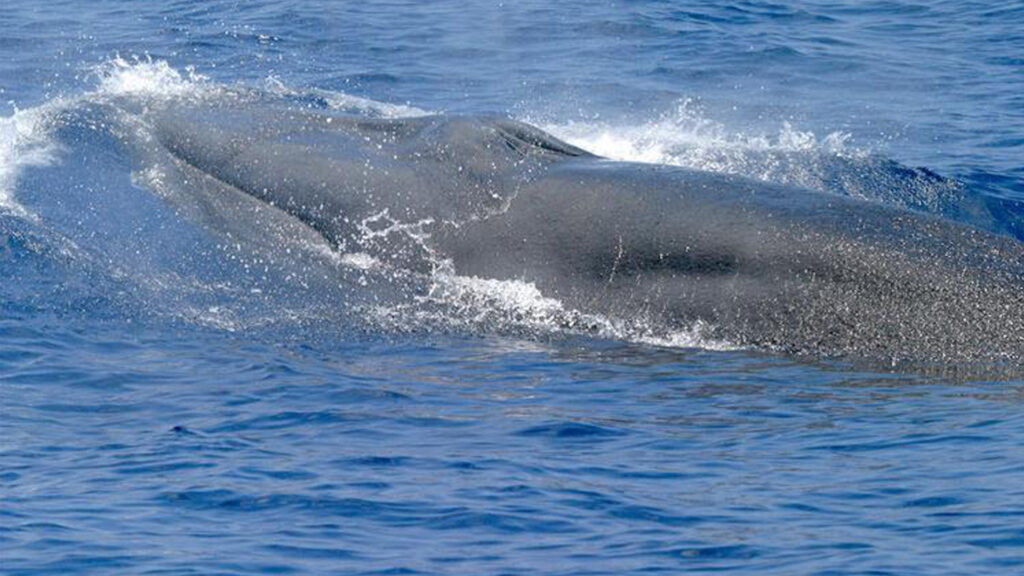By Mia McCormick, Environment Florida
Two months after the 2010 Deepwater Horizon spill, I sat near the window of a C-130 aircraft next to a Coast Guard officer, documenting the spreading devastation with a camera for a southwest Florida news station. Suddenly, my heart stuck in my throat. I noticed a beautiful pod of dolphins swimming toward the dark shimmering oil on the Gulf’s surface. There was nothing I could do.
It’s estimated that nearly 26,000 marine animals died in that spill. The fear and sadness I felt seeing the pod swimming toward danger is something I’ll never forget and reveals the reality behind the statistic. The final toll on our marine ecosystems will never be known.

Having witnessed this devastation, I was excited when I heard in 2021 that scientists had discovered a unique, mysterious and largely unknown species in the Gulf, the Rice’s whale. Rice’s whales are one of the only baleen whales that prefer warm, tropical water. They can grow to around 40 feet long and spend their time bouncing between the seafloor during the day and the ocean surface at night. They usually travel solo or with one or two companions and they are so new, researchers still aren’t sure what they eat. There’s so much that we need to learn about them, but we may not get that chance.
Almost 14 years after Deepwater Horizon, thanks to cleanup efforts and the time marine habitats needed to heal, the waters off of our Gulf Coast are still home to a rich biodiversity of ocean creatures. But just when it seemed we might be making progress, on Nov. 16, a new devastating oil spill hit the Gulf, when the Main Pass pipeline spilled 1.1 million gallons of oil 19 miles offshore Plaquemines Parish in southeast Louisiana. The largest spill since 2010, it reminds us that, despite assurances from the industry and its supporters, drilling puts Rice’s whales and all ocean life at risk.
It’s estimated that more than 20% of the entire Rice’s whale population was lost in the Deepwater Horizon disaster. Today, before the latest spill, there were thought to be fewer than 100 Rice’s whales left in existence. It’s clear that when we drill, we spill. We can’t risk losing these last 100 whales, and so many other incredible species, in the name of dirty oil and gas.

Even without spills, drilling in Gulf waters poses a threat to these whales. Vessel strikes and entanglements with marine debris are also part of the problem. Rice’s whales have already been struck and more drilling means more boats. With them comes a higher risk of deadly strikes for these unique creatures.
The health of our ocean, the amazing ecosystems it contains and the whales that call it home aren’t worth risking for a declining industry that drives climate change. Ultimately, we need the Biden administration to stop oil and gas leasing in the Gulf of Mexico. In the meantime, they could start by restricting leasing activity and require reduced vessel speeds in the Rice’s whale habitat to regulate vessel traffic and lower the risk of deadly strikes.
Newly discovered and newly extinct should never be in the same sentence. These whales deserve a chance at survival and, because they are unique to U.S. waters, we have a special responsibility as a nation to protect them. We still have a chance to save these gentle giants, and other wonderful ocean creatures like the dolphins I saw in 2010, but time is running out.
Mia McCormick is an advocate with Environment Florida. This opinion piece was originally published by the Tampa Bay Times, which is a media partner of The Invading Sea.
If you are interested in submitting an opinion piece to The Invading Sea, email Editor Nathan Crabbe at ncrabbe@fau.edu. Sign up for The Invading Sea newsletter by visiting here.



